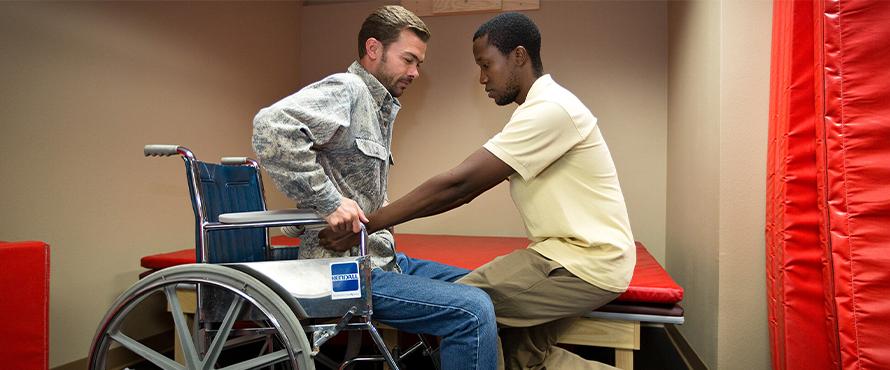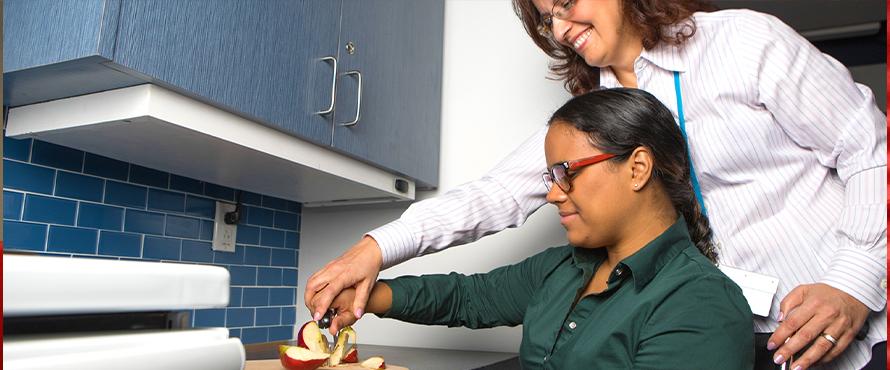Occupational therapists (OTs) help patients improve their ability to perform tasks in living and working environments. They work with individuals who suffer from a mentally, physically, developmentally, or emotionally disabling condition. Occupational therapists use treatments to develop, recover, or maintain the daily living and work skills of their patients. The therapist helps clients not only to improve their basic motor functions and reasoning abilities but also to compensate for permanent loss of function. The goal is to help clients have independent, productive, and satisfying lives.
Occupational therapists assist clients in performing activities of all types, ranging from using a computer to caring for daily needs such as dressing, cooking, eating, and driving. Services typically include: customized treatment programs to improve one's ability to perform daily activities; comprehensive home and job site evaluations with adaptation recommendations; adaptive equipment recommendations and usage training; and guidance to family members and caregivers
The work of an occupational therapist may involve working in a variety of settings, including hospitals, clinics, schools, and community-based organizations. Occupational therapists enter their careers with either a master’s degree (MOT) or a doctoral degree in occupational therapy (OTD). Occupational therapy programs are accredited by the Accreditation Council for Occupational Therapy Education, part of the American Occupational Therapy Association. All states require occupational therapists to be licensed. Licensing requirements vary by state, but all require candidates to pass the national examination administered by the National Board for Certification in Occupational Therapy (NBCOT). Learn more
Note: It is not recommended to self-advise. There are many things to consider besides the required courses such as prerequisites and course sequencing, balancing your schedule, building in time for volunteering, shadowing, research, entrance exam preparation, and planning for the application cycle. See the Director of Pre-professional Advising for individualized long-term planning.
Students who are planning to apply to occupational therapy programs will need the following:
- Bachelor’s degree with a competitive cumulative and science GPA
- Required prerequisite coursework which can vary from school to school
- Research experience
- Clinical experience and service
- Communication and leadership skills
- Letters of recommendation
- Personal Statement
- Graduate Record Exam (GRE)
- Understand the application timeline
- Illinois Occupational Therapy programs
- Pre-OccupationalTherapy resources
Degree and GPA
A baccalaureate degree is required in any field as long as the prerequisites are met. Biology and Biochemistry majors can meet all prerequisites within their programs. Other majors will still need to take the prerequisite courses in addition to their major and degree requirements.
To be a competitive applicant students must have a strong grade point average (GPA). Professional programs will look at several GPAs:
- Cumulative GPA: all courses and from all schools attended including repeats, remedial courses, and possibly graduate-level courses
- Science GPA: includes biology, chemistry physics, and often math (or BCP/BCPM)
- Prerequisite GPA: calculated only on the prerequisites necessary for that particular professional school program.
- All other GPA: calculated on all courses except your science courses
Professional schools do not honor “grade forgiveness” or “grade replacement” for repeated courses. All grades count and repeats are averaged together. There is also no expiration date on courses taken many years ago.
Prerequisite Coursework
The following list indicates the most common classes required or highly recommended by most programs. Applicants should always check directly with each program they are applying to and see the Preprofessional Advisor for more information.
Required
| Writing I & II | ENG 101 & 102 |
| Biology I & II | BIOL 201 & 202 |
| Anatomy & Physiology I & II* | BIO 318 & 319 |
| Anthropology or Sociology | ANTH 212 or Soc 100 |
| General/Into to Psychology | PSY 200 |
| Lifespan, Child or Development Psych (Some require both) | PSY 110, 215, or 310 |
| Abnormal Psychology (Psychopathology) | PSY 340 |
| Statistics or Research Methods | MATH 275 or PSY 202 |
| Prerequisite: BIO 301 - Cell Biology | |
Highly recommended or required by some programs
| Medical Terminology | BIO 316 |
| Sociology or Psychology of Aging | SOC 302 or PSY 325 |
Additional Courses to Consider
Sociology or Psychology of Aging, additional Social/Behavioral Sciences, Intro to OT, CPR certification.
Prerequisite Notes
- AP and IB credits are generally not accepted toward prerequisites.
- Community college credits can be viewed differently by each program. Check before applying.
- Some programs do not accept international courses to meet prerequisites. Check before applying.
- Online lab courses are not accepted toward prerequisites. Some programs will not allow any online coursework. There may be some exceptions for courses taken at the height of the COVID-19 pandemic. Check before applying.
- Too many withdrawals (W's) on your transcripts can reflect negatively on your application.
- Some programs have expiration dates on their prerequisites. Make sure you have taken them within the program's time requirements.
Research Experience
Research is not required but is always recommended and can make an applicant stand out. Always check with the schools you are planning to apply to. Subjects can include basic science, biomedical, and clinical research, as well as social science and health systems research. You can reach out to the Student Center for Science Engagement for help finding research opportunities.
Clinical Experience and Service
Applicants are expected to have a good understanding of their future profession and are strongly encouraged to shadow and observe a number of professionals in the clinical setting. Experiences should be meaningful to you on a personal level and reflect your professional goals. Remember that you will be expected to write thoughtful descriptions of your experiences in the application process. Quality over quantity is most important. Programs would rather see commitment and dedication over time than hopping from one short-term experience to the other. Keep a journal not just to document your hours, but to express how various interactions impacted you and your long-term goals.
Shadowing/Clinical Experience
Ask a practitioner to observe their work. This will give you a glimpse into their daily routine and allow you to see if you’re really a good fit for the profession. Shadowing opportunities are notoriously hard to find, so start looking as soon as possible. The most common way to find shadowing opportunities is through networking: ask family, friends, and colleagues if they know a professional that would allow you to shadow them. The more they know about your aspirations as a future health professional, the more likely they are to take you on for shadowing or refer you to a colleague who will.
Professional schools like to see as much hands-on, direct patient care as possible. Applicants should complete at least 50 hours of occupational therapy experiences of observing, volunteering, or working. More is always better. It is recommended that the experiences be of different specialties. The more extensive and varied your experiences, the more prepared you’ll be for your program. It is recommended to get experience/familiarity with occupational therapy through observation, volunteering, or work experience with occupational therapy practitioners in at least three of the following areas: Children and Youth, Work and Industry, Rehabilitation, Health and Wellness, Mental Health, and Productive Aging. Some students apply for a job as a rehab aide to start gaining experience.
Volunteer/Community Service
You are preparing for a "helping" profession and it is assumed that you care about those you are planning to serve. Therefore, it is important to have volunteer experiences demonstrating a commitment to service. This should be ongoing throughout your college years. Medical professions often play a big role in the community. Getting involved in your community is a great way to experience this. You can volunteer at a church or other religious facility, community centers, homeless shelters, soup kitchens, food pantries, etc.
Volunteering in a health setting will give you exposure to various practitioners working with patients. Look for opportunities to assist, be part of a team, make decisions, and lead others. There are many ways to volunteer in the health setting such as hospitals, rehabilitation facilities, nursing/retirement homes, doctors’ offices, public clinics, suicide hotlines, hospice centers, crisis centers, or study abroad experiences like medical mission trips.
Communication and Leadership Skills
Get involved on campus through student government, honors programs, or student organizations that are related to your major or future profession such as the Future Health Professionals Club. Get involved by participating in their events. They often conduct enrichment programming and even community service. Try to become an officer in an organization to gain leadership experience. You must take this role seriously though and live up to the commitment you make. You can search all of NEIU's Student Organizations to find others that are a good fit for you.
As a health professional, you will be a leader and team member with your patients, staff, colleagues, and in your community. Other ways to gain leadership experience include offices held in organizations, committee work, leadership in religious activities, coordinating a project; managing, training, and supervising at work, teaching or training experience of any kind, tutoring, as well as peer counseling or mentoring.
Letters of Recommendations (2-4)
You will need at least two strong letters of recommendation ideally from science faculty and relevant professionals that have supervised you in a work, shadowing, or volunteer setting. You will need to give them at least two months’ notice so be sure to research the letter of recommendation requirements for each program you're planning to apply.
Get to know people from these categories so you will feel comfortable asking them to write excellent letters for you.
- Occupational Therapists you shadowed or worked with
- Science Professor
- Supervisor
- Another professor
Learn more on how to request letters of recommendation. Please note that NEIU does not offer a committee or composite letter.
Personal Statement
You will have to write a personal statement/essay as part of your application. It should be about two pages double-spaced and discuss how your life has led you to your desired career. While most personal statements are general in nature and can be used for multiple applications, some programs want applicants to follow specific guidelines and answer prompts that they will provide. Check with the schools you’re applying to and make sure you’re following directions. Look up examples of personal statements and have several people read yours before submitting it. If you would like to talk about why you’re interested in a particular program you can write several statements and customize them as needed.
This is also your opportunity to show the admissions committee who you are beyond your GPA, test scores, and experiences. It communicates what is important to you and explains in-depth your reasons and motivations for pursuing professional school. Additionally, a personal statement can help explain any gaps in education or experiences, as well as any weaknesses in an application.
Learn more about how to write Personal Statements.
Graduate Record Exam (GRE)
The GRE is administered throughout the year. It may be repeated, but the best strategy is to prepare thoroughly and take it once. Taking the exam by the spring of the year before you wish to enter PT school will enable you to apply earlier. Read more information on the GRE.
GRE structure:
- Two (2) multiple choice sections which are scored on a scale of 130-170
- Verbal Reasoning
- Quantitative Reasoning
- One (1) Analytical Writing essay that is scored on a 6-point scale.
FREE GRE Prep for NEIU Students
Northeastern Illinois University has partnered with Kaplan to launch "Prepare for Illinois' Future Powered by Kaplan's All Access License," a program that provides FREE access to Kaplan's industry-leading resources and is administered through the Illinois Student Assistance Commission (ISAC). This means you can prepare for more than 40 different graduate admissions, licensure and credentialing exams, and take skills development courses – all at no cost to you.
NEIU students can set up an account or log in to Kaplan's NEIU Portal to access GRE prep.
Additional information is available on the Student FAQ Flyer.
Other GRE Preparation Resources
Application Timeline
The application cycle for OT school begins about 12 months before you intend on enrolling, in the summer of the year prior to enrollment. However, the exact timing depends on when you will take the GRE, complete prerequisites, etc. Meet with your pre-professional advisor to develop a long-term plan for applying. Keep in mind that course scheduling, extra-curricular activities, exam preparation, and even your personal and family life can all contribute to the need of having flexibility in your timeline.
The application service, OTCAS, opens in July and the school deadlines can go through May of the following year. You should have selected which optometry schools to apply to, have contacted those who will write letters of recommendation for you, ordered official transcripts from all colleges attended, and completed your personal statement by this time. Make sure you pay attention to specific deadlines for the schools to which you are applying. Application services verify primary applications and notify applicants of verification or problems.
Illinois Occupational Therapy Programs
MOT: Master’s Degree
OTD: Entry-Level Doctorate
- Chicago State University (MOT/no GRE) (Chicago)
- Elmhurst University (MOT/GRE rqd) (Elmhurst)
- Governors State University (MOT/no GRE) (University Park)
- Midwestern University (OTD/no GRE) (Downers Grove)
- North Central College (MOT/no GRE) (Naperville)
- Rush University (OTD/no GRE) (Chicago)
- University of Illinois (OTD/GRE rqd) (Chicago)
Pre-Occupational Therapy Resources
- Occupational Therapy Centralized Application Service (OTCAS)
- OTCAS Fees and Fee Waivers
- Kaplan's NEIU Portal (Free GRE Prep for NEIU Students)
- American Occupational Therapy Association (AOTA)
- Illinois Occupational Therapy Association (ILOTA) Pre-OT Membership
- Athletico - Student Resources (Events, Shadowing, Webinars)
- Occupational Outlook Handbook - Occupational Therapists










